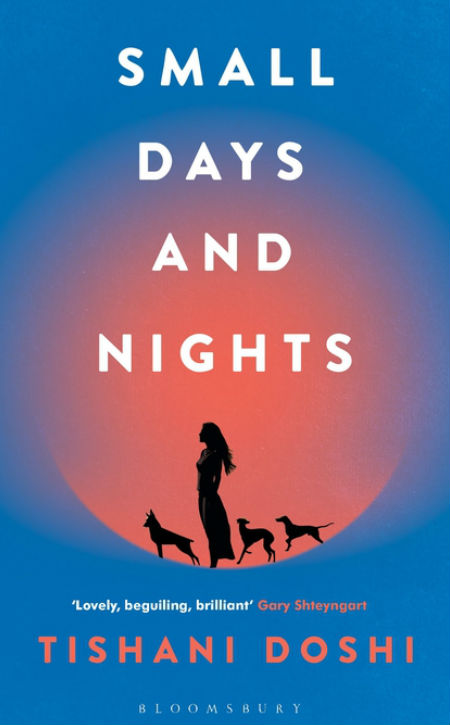
No one ever handles life quite like they expect to, nor the way triumphantly-inspiring feel good Hollywood tales laud or cajole you.
That’s partly because life is unpredictable daring you to ready yourself for its almost wilful twists and turns but because we are imperfect beings, our heads full of gorgeously-realised dreams but our hands dirty with the messiness of tawdry realisation.
It’s not ideal but then life rarely is and we either make our peace with the great chasm between expectation and reality or we go slightly, quietly mad, unable to process the fact that the vision in our mind is not being realised before us, despite our most trenchant, determined efforts.
In Tishani Doshi’s luminously poetic book Small Days and Nights, Grace, newly returned to Madras – it’s officially now Chennai but the book’s protagonist, awash in the unsettling middle ground between the past and the present, prefers to call it by its old colonial-era name – to cremate her mother and settle her affairs, is caught inbetween these two impetuses, trying her best to bridge the yawning gap between memory and present, expectation and realisation, while mired in the fact that so much of her life is some sort of bewildering disappointment.
Or, at least, not quite wanted, expected or sought.
“Return is never the experience you hope for. After all those lost years in America I wanted to talk into the streets and know them, but there is a new tightness to the city, an exuberance that is difficult to understand …
The air attacks you at the threshold. Heavy, sweaty air, which smells of something that was once sweet, now rotting. Damp in the armpits and crotch. Jeans sticking to thighs …
Murali is waiting for me in the usual place. He is old and as dark as the night, hairy-eared and half blind. The way he drives, it will take us five hours instead of three, but Ma always valued loyalty over ability, even though she could rarely be relied upon to be steadfast.” (P. 9)
But then, she asks herself, what exactly was it she was expecting?
Her somewhat-removed Italian father, who got stuck in India when circumstances truncated his dreams of a life lived in many foreign countries building up a storied corporate career, who only seemed to find some measure of peace, albeit once closed off to some salient, key parts of his time with Grace’s mother, isn’t exactly a paragon of existential commitment or direction.
Nor was her mother, who spent her entire life either fighting with her marooned husband, seeking solace in the peace and quiet of the countryside, or disappearing, every Thursday, on errands unnamed and unrevealed, much help, lost in a sense in the guilt of a fateful decision that materially altered her life, that of her husband’s, the state of her marriage and, importantly for the storyline of Small Days and Nights, the sense of wellbeing and life trajectory of her daughter Grace.
The fateful decision in question, to surrender her second daughter with Down’s Syndrome, Lucia, to a residential care facility she invested great time and money in, without ever telling Grace, means that the onetime only child comes home to India to discover there’s a whole other part of her family she knew nothing about.
That would be a shock at the best of times, but with her marriage to American Blake in tatters, her lonely life in the States behind her, one that never felt like it fit her properly, and her forward momentum heading home with wobbly uncertainty, it proves to be pivotal in the way she handles her return home (which no longer quite feels like that, despite the presence of many touchstones of childhood, such as her family’s driver Murali or her mother’s close friend, Auntie Kavitha).

Deciding that she must take Lucia out of the residential care facility and to her mother’s blue-shuttered pink house which sits on the edge of an undeveloped beach between Chennai and Pondicherry, where she hopes she’ll find the contentment and sense of being and belonging that has thus far eluded her, she sets about building a new kind of family.
But this is where things get real, where the fairytale, the one we tell ourselves we should have and we deserve, stubbornly refuses to materialise.
Lucia, while she is in love with the many dogs and their puppies that live on the property, and delights in sitting in the waves and having the water temporarily subsume, rapturous giggles and all, is not conducive to this happily ever after world Grace thinks she’s crafting – to be fair she is not even sure what she is doing or why, just that she should do it – and Grace herself struggles to adapt to the competing demands of complicated domesticity, local village headman Valluvan who expects to act like the financial patron her mother was, Lucia’s old Teacher Mrs Gayatri and the bottomless pit of her facility (the one where Lucia lived happily) and the pull of romantic and social interests in nearby but far away Madras.
Like all of us, she doesn’t resolve these impossible to reconcile demands anywhere as well as she thinks she will, and much of the novel’s great power and narrative draw comes from the way Grace struggles to craft a life out of various un-asked for pieces when she’s not entirely certain what kind of life she wants in the first place.
Sound familiar?
“The drive home takes longer than usual. I have never made a trip to the city without spending at least one night there, so I feel the fatigue of the traffic, the crowds, the ting-tong mall music. Lucia sleeps, head knocking against the glass of the window, tongue poking out of her mouth. Does she dream of her new pink dress? I feel angry, powerless; I can’t articulate it, but it has to do with the way people look at her. Families, grown people who can see there’s something different about her but who are so unused to the sight they can only gape. I wanted to smash in some of their ugly faces. I had hoped for what? Empathy? A jaunty day out with my sister. Instead, I am drained, barely able to drive back home.” (PP. 127-128)
Chennai-born poet and novelist Doshi writes beautifully of the world of Tamil Nadu, the state she calls home and one of the epicentres of an India that is, like Grace herself, fumbling, not always successfully, to some kind of transformation.
Written as both a love letter but also remonstration of her home state’s shortcomings, both addressed and articulated with the intimacy and knowingness of someone who has lived with both the good and the bad all her life, Small Days and Nights, is brilliantly, captivatingly real.
So real in fact that there are many times when you find yourself silently, or not so silently, admonishing Grace for her poor choices or lack of direction, but then you catch yourself, realising that you too have been where Grace is, you have also faced a multiplicity of choices and have not always chosen wisely nor acted sagely on those choices.
The beauty of Small Days and Nights, quite apart from Doshi’s lush, revealing and heart-opening prose, is the way it talks of how we all handle life in brutal but understanding tones, happy to lay out how the consequences of our actions can affect and those we love, while remaining appreciative of the fact that none of us are perfect, and that we all, for better or worse, make the best of the hands we are dealt, with the hope that something good, something pleasing and something ultimately satisfying and liveable, can be fashioned from it.